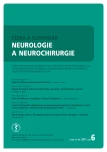-
Medical journals
- Career
Tractography in Neuronavigation during Intraaxial Brain Tumour Surgery Near Corticospinal Tract
Authors: E. Neuman 1; T. Svoboda 1; P. Fadrus 1; M. Keřkovský 2; A. Šprláková-Puková 2
Authors‘ workplace: LF MU a FN Brno Neurochirurgická klinika 1; LF MU a FN Brno Radiologická klinika 2
Published in: Cesk Slov Neurol N 2011; 74/107(6): 675-680
Category: Short Communication
Overview
Objective:
This study was conducted to assess the benefit of integrating corticospinal tract diffusion tractography into neuronavigation during operations for intra-axial brain tumours located close to the corticospinal tract.Methods:
Diffusion tractography was used, together with subcortical electric stimulation, to locate the corticospinal tract. Motor-evoked potentials elicited by stimulation were recorded. The method was used in five patients with intra-axial brain tumour (astrocytoma gr. II–IV).Results:
The corticospinal tract was successfully confirmed by electro-stimulation in the approximate location predicted by diffusion tractography in all patients. Resection of the tumour was terminated when motor-evoked potentials were elicited by a stimulus current of 15 mA (monopolar stimulation, train of four pulses at a frequency of 500 Hz and pulse duration of 400 µs). No patient has since suffered from new permanent neurological deficit.Conclusion:
Although we remain convinced that, due to the brain shift that occurs during tumour resection, it is not enough to rely solely on the projections of the corticospinal tract in neuronavigation without electrophysiological validation of the tract course, diffusion tractography integrated into neuronavigation appears to be a valuable guide for the identification of the corticospinal tract in the surgical field.Key words:
neuronavigation – diffusion tractography – corticospinal tract – motor evoked potentials – brain tumours – diffusion tensor imaging
Sources
1. Ostrý S, Stejskal L. Evokované odpovědi a elektromyografie v intraoperační monitoraci v neurochirurgii. Cesk Slov Neurol N 2010; 73/ 106(1): 8–19.
2. Nimsky C, Ganslandt O, Hastreiter P, Wang R, Benner T, Sorensen AG, Fahlbusch R. Preoperative and intraoperative diffusion tensor imaging based fiber tracking in glioma surgery. Neurosurgery 2005; 56(1): 130–137.
3. Kamada K, Todo T, Ota T, Ino K, Masutani Y, Aoki S et al. The motor-evoked potential threshold evaluated by tractography and electrical stimulation. J Neurosurg 2009; 111(4): 785–795.
4. Mikuni N, Okada T, Enatsu R, Miki Y, Hanakawa T, Urayama S et al. Clinical impact of integrated functional neuronavigation and subcortical electrical stimulation to preserve motor function during resection of brain tumors. J Neurosurg 2007; 106(4): 593–598.
5. Mukherjee P, Chung SW, Berman JI, Hess CP, Henry RG. Diffusion tensor MR imaging and fiber tractography: technical considerations. AJNR Am J Neuroradiol 2008; 29(5): 843–852.
6. Tournier JD, Yeh CH, Calamante F, Cho KH, Connelly A, Lin CP. Resolving crossing fibres using constrained spherical deconvolution: validation using diffusion-weighted imaging phantom data. Neuroimage 2008; 42(2): 617–625.
7. Schonberg T, Pianka P, Hendler T, Pasternak O, Assaf Y. Characterization of displaced white matter by brain tumors using combined DTI and fMRI. Neuroimage 2006; 30(4): 1100–1101.
8. Lu S, Ahn D, Johnson G, Cha S. Peritumoral diffusion tensor imaging of high-grade gliomas and metastatic brain tumors. AJNR Am J Neuroradiol 2003; 24(5): 937–941.
9. Zolal A, Sameš M, Vachata P, Bartoš R, Nováková M, Derner M. Použití DTI traktografie v neuronavigaci při operacích mozkových nádorů. Cesk Slov Neurol N 2008; 71/104 (3): 352–357.
Labels
Paediatric neurology Neurosurgery Neurology
Article was published inCzech and Slovak Neurology and Neurosurgery

2011 Issue 6-
All articles in this issue
- Surgical Treatment of Brachial Plexus Injury
- Questionnaires of Activities of Daily Living in Patients with Alzheimer Disease
- Parkinsonian Phenotypes – towards New Nosology of Atypical Parkinsonian Syndromes
- Updated Insight into the Pathophysiology of Migraine – an Update
- Motor Aspects of Speech Imparment in Parkinson‘s Disease and their Assessment
- Tractography in Neuronavigation during Intraaxial Brain Tumour Surgery Near Corticospinal Tract
- Amendment of the Czech Addenbrooke’s Cognitive Examination (ACE-CZ)
- Miller Fisher Syndrome – Four Case Reports and Review of Current Concept
- Parkinson’s Disease with a Phenotype of Progressive Supranuclear Palsy – a Case Report
- Cognitive and Emotional Changes Five Years after SAH – a Case Report
- Amisulpride in the Treatment of Schizophrenia
- The Reasons and the Process of Amendment of the Czech Addenbrooke’s Cognitive Examination (ACE-CZ)
- Postural Reflexes in Conditions of Visual Disturbance
- Extension of the Therapeutic Time Window for Intravenous Thrombolysis Should Not Lead to Prolongation of Door-to-Needle Time
- Czech and Slovak Neurology and Neurosurgery
- Journal archive
- Current issue
- Online only
- About the journal
Most read in this issue- Miller Fisher Syndrome – Four Case Reports and Review of Current Concept
- Updated Insight into the Pathophysiology of Migraine – an Update
- Amendment of the Czech Addenbrooke’s Cognitive Examination (ACE-CZ)
- Surgical Treatment of Brachial Plexus Injury
Login#ADS_BOTTOM_SCRIPTS#Forgotten passwordEnter the email address that you registered with. We will send you instructions on how to set a new password.
- Career

